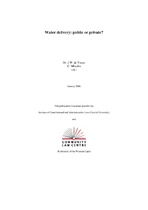Water delivery: public or private?
Abstract
The landscape within which human rights are protected and realised has
changed dramatically in the last few decades. One of the main driving
forces for this change is economic globalisation and the weakening of the
traditional state. In many parts of the world, the private sector is
becoming increasingly involved in performing functions that have
traditionally been reserved for the state. Even the provision of basic
services, such as water, is not exempt from this development. Private
sector involvement varies from the outright sale of public assets to the
outsourcing of essential service delivery functions. Moreover, the public
sector is pressurised to ‘downscale’ and make efficiency gains by placing
certain trading functions at arms length in semi-private entities. The result
of all of this is the increasing commodification of the provision of basis
services, such as water.
However, such basic services are guaranteed within a human rights
framework as part of international law. In principle, it is only states that
are the bearers of human rights obligations in international law. The
extent to which private entities can bear human rights obligations remains
controversial and human rights law is not concerned with whether the
ultimate provider of socio-economic goods and services is either the state
or the individual.
This book contains a compilation of papers dealing with access to
water. In South Africa, many cities and municipalities have delegated
bulk water purification and management to private water services
providers. Some view this as abdication from state responsibility and a
violation of the constitutionally protected right of access to sufficient
water. Others, including the state, argue that private sector involvement is
indispensable for realising access to water.

